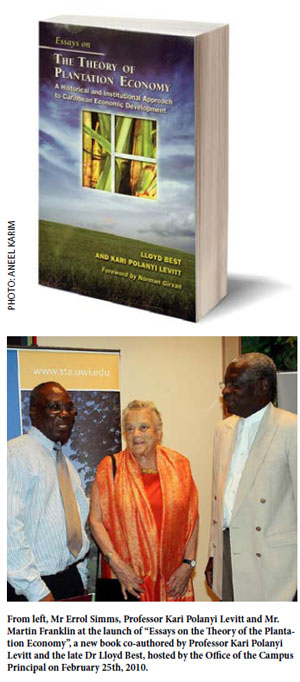 A welcome return to new thought A welcome return to new thought
By Bryan Khan
It is now been many decades since Caribbean scholars have acknowledged that the theoretical explanations offered by mainstream academics have been too generalized to adequately capture the essence of the realities of the Caribbean experience. This has been a journey which has drawn on the intellectual capacities of some of the region’s greatest historians, political scientists, sociologists, and of course, economists. What is interesting to note, is that many of the major contributions to Caribbean thought are attributed to works which have blurred the line between these different disciplines.
A significant opportunity arises when a literary work is able to transcend these lines, and contribute to the development of not only its primary discipline, but to a uniquely relevant Caribbean ideology. It is in this context that the concept of the Plantation Economy Model stands out as a key piece of the mosaic that is Caribbean society. While the Plantation Economy is at heart, an economic model, its implications and adaptations have transcended the traditional economic framework, and have significantly contributed to the emergence of a holistic and continuously evolving developmental paradigm.
By establishing the premise that the history of our region cannot be isolated from our economic context, the Theory of the Plantation Economy has given us a construct in which we are able to analyze our positions. By shifting our focus towards a theoretical construct which is explicitly based on the unique context of our colonial heritage and history, the idea of the Plantation Economy is one which has propelled independent Caribbean thought to its rightful place.
Essays on the theory of Plantation Economy is a significant literary work which I am sure will find its way into the reading lists and course curricula of regional academics, and hopefully, also into the hands of any casual reader, interested in understanding the historical evolution of the Caribbean economic framework. While the various discourses in this book have been discussed, and in many instances published, at various points in the past, it is a significant accomplishment to have compiled these essays into a single cohesive literary work.
I would also like to highlight the fact this publication is certainly more than the sum of the individual essays of which it is comprised. It begins with a comprehensive and insightful forward by Professor Norman Girvan, appropriately titled ‘The Plantation Economy in the Age of Globalization’ which aptly sets the tone of the text, introducing the theme of the book not only from its historical perspective, but also adopting a contemporary perspective.
Chapter one is an appropriate opening - Best’s ‘On the Teaching of Economics’, first presented at the 1973 Conference of Secondary School Teachers of Economics. The book derives its tagline from Chapter two’s title – ‘A Historical and Institutional Approach to Caribbean Economic Development’. Like Chapter two, Chapters three to five are Best-Levitt collaborations, taking the reader though a discourse on the Legacy of the Plantation and the Structures of Caribbean Economies, where the core construct of the Plantation Model is explored in ‘Revised and Expanded Model of Pure Plantation Economy’ - a comprehensive and seminal paper, accounting for almost a third of the book’s content. It is at this point, that the work identifies the plantation economy as a hinterland, characterized by subordination and dependency on the dominant metropole.
After being presented with the Best-Levitt ‘Accounting Framework for the Plantation Economy’, the reader is seamlessly drawn into Levitt’s construction of ‘A System of National Accounts for Trinidad and Tobago.’ With the emphasis on the historical continuities of dependency established, Levitt seeks to address the question of the requisite changes which would allow for the break with dependency, in ‘In Search for Model IV’, or the connotatively labeled ‘anti-model’.
The last chapter reverts to the Best-Levitt formulation, and provides a Critical Review of the Contributions of Lewis and Seers, with specific reference to Issues of Industrialization and Employment in the Caribbean; rounding off the book’s theme of Caribbean Development, and leaving the reader to contemplate the evolution of perspectives within Caribbean Economic Thought.
With the global and regional economies quickly evolving via the technological progress characterized by today’s world, we are once again faced with a critical consideration: What is the impact and significance of the Plantation Legacy within our evolving economic landscape?”
While the Best-Levitt generation of economic thought has given us a construct in which we can explain and understand our regional economies, discourse on the appropriate way forward still rages on.
Bryan Khan, an economics graduate of The UWI, is Research Officer, Telecommunication Authority of Trinidad and Tobago.
|





